 Loading... Please wait...
Loading... Please wait...- SWRB Home
-
Free Resources
- Short Listings Of Free Reformation & Creation Resources
- Free Reformed, Puritan, Covenanter and Creationist Videos
- Thousands of Links to Free Audio, Video and Printed Resources
- Free Puritan Books, Reformed MP3s, and Calvinist Videos
- Puritan Quotes, Free Reformation MP3s, Reformed Books and Calvinist Videos From PuritanDownloads.com On FaceBook
- Shipping & Returns
- Blog
- Privacy Policy
- Contact Us
- Payment Options
- Help
-
About Us
- Sitemap
Pastor Scott Brown, on the left in the video above, is the Director of the National Center for Family-Integrated Churches (NCFIC)
Resource Categories
- PURITAN HARD DRIVE REVIEWS
- PASTOR ROB VENTURA ON THE PURITAN HARD DRIVE
- DR. VODDIE BAUCHAM, JR. ON THE PURITAN HARD DRIVE
- R. C. SPROUL ON SWRB
- DR. JOEL R. BEEKE ON THE PURITAN HARD DRIVE
- PASTOR GREG L. PRICE ON THE PURITAN HARD DRIVE
- DR. MATTHEW MCMAHON ON THE PURITAN HARD DRIVE
- PASTOR SCOTT BROWN ON THE PURITAN HARD DRIVE
- PASTOR W. J. MENCAROW ON THE PURITAN HARD DRIVE
- JOAQUIN FERNANDEZ ON THE PURITAN HARD DRIVE
- PASTOR DAVID SILVERSIDES ON THE PURITAN HARD DRIVE
- JOHN HENDRYX ON THE PURITAN HARD DRIVE
- PASTOR KEVIN GUILLORY ON THE PURITAN HARD DRIVE
- RICHARD BENNETT ON THE PURITAN HARD DRIVE
- DR. KENNY RHODES ON THE PURITAN HARD DRIVE
- JUSTIN RAWSON ON THE PURITAN HARD DRIVE
- PASTOR JAMES WALLACE ON THE PURITAN HARD DRIVE
- PASTOR RICHARD GAGNON ON THE PURITAN HARD DRIVE
- PASTOR JOE HAYNES ON THE PURITAN HARD DRIVE
- DR. STEVEN DILDAY ON THE PURITAN HARD DRIVE
- PASTOR ANDREW COMPTON ON THE PURITAN HARD DRIVE
- TERENCE ELLARD ON THE PURITAN HARD DRIVE
- PASTOR JERRY JOHNSON ON THE PURITAN HARD DRIVE
- PASTOR DAVID PETRIE ON THE PURITAN HARD DRIVE
- JIM DODSON ON THE PURITAN HARD DRIVE
- PASTOR BRIAN SCHWERTLEY ON THE PURITAN HARD DRIVE
- PASTOR PHIL GIBSON ON THE PURITAN HARD DRIVE
- MEL R. EVERINGHAM II ON THE PURITAN HARD DRIVE
- PAUL BLYTH ON THE PURITAN HARD DRIVE
- STEVE KETTLER ON THE PURITAN HARD DRIVE
- D. M. (CALIFORNIA) ON THE PURITAN HARD DRIVE
- MICHAEL CAUGHRAN ON THE PURITAN HARD DRIVE
- WIILIAM NOPPER IV ON THE PURITAN HARD DRIVE
- LINDA THERIAULT ON THE PURITAN HARD DRIVE
- WILLIAM WARNOCK ON THE PURITAN HARD DRIVE
- ROBERT KOH ON THE PURITAN HARD DRIVE
- WHAT'S ON THE PURITAN HARD DRIVE?
- ALL PURITAN HARD DRIVE VIDEOS
- PHD-ODE INSTALLATION VIDEOS
- COMMENTS ON SWRB
- ALL PURITAN QUOTE VIDEOS
- PURITAN HARD DRIVE SCREENSHOTS
- PURITAN HARD DRIVE MINISTRY AND DONATION OFFERS
- TABLE OF RESOURCE CATEGORIES
- Advanced Studies
- SWRB SERMONAUDIO MOBILE APP
- Apologetics
- Assurance
- Attributes and Holiness of God
- Augustine
- Banner of Truth
- Baptism
- Beginners
- Bibles (Geneva, KJV, Hexapla, etc.)
- Biblical Counseling
- BIBLICAL HD COLLECTION
- Biblical Interpretation (Hermeneutics)
- Biographies and Autobiographies
- Calvinism and the Sovereignty of God
- CALVINISM HD COLLECTION
- CALVINIST CLASSICS HD COLLECTION
- Charles Spurgeon
- Children's Books
- CHRISTIAN EDUCATION HD COLLECTION
- Christian History
- Church Government
- Civil Government and Resistance
- CLASSIC CHRISTIAN HD COLLECTION
- Classic Puritan and Reformed Sets
- Commentaries
- Contemporary Issues
- Covenant Theology and Covenanting
- COVENANTER HD COLLECTION
- Covenanters and Covenanted Reformation
- Creation and Creationism
- Creeds, Confessions and Covenants
- Cults, False Religions, Psychology, Humanism
- Dealing with Affliction, Suffering, and Sickness
- Debates
- Dutch Reformed
- Education and Home Schooling
- English Puritans, Covenanters and Reformers
- Family, Children, Home, and Family Worship
- First Reformation
- Five Points of Calvinism (TULIP)
- For Pastors and Elders
- For Seminary Students
- FREE PURITAN & REFORMATION MP3 AUDIO SERMONS/BOOKS
- FREE PURITAN BOOKS, REFORMATION MP3s, PDFs, VIDEOs
- George Gillespie
- God's Law, The Ten Commandments, etc.
- Greg L. Price on Headcoverings
- Heaven, Hell and the Final Judgment
- Holy Days (Lord's Day, Christmas, Easter, etc.)
- HOME SCHOOL HD COLLECTION
- Intermediate Studies
- John Bunyan
- John Calvin
- John Knox
- John Owen
- Jonathan Edwards
- Justification
- Languages, Dictionaries, Reference, etc.
- LOOK WHO LOVES THE PURITAN HARD DRIVE
- Lord's Supper (Communion)
- Marriage, Courtship, etc.
- Martin Luther and Lutheranism
- Martyrs and Persecution
- Other Protestant Works
- Predestination and Providence
- PRESBYTERIAN HD COLLECTION
- Presbyterians and Presbyterianism
- Prophecy, Antichrist, and Eschatology
- PROTESTANT HD COLLECTION
- PSALM SINGING MP3s (COMPLETE SET)
- Psalters, Psalm Singing and Music
- Puritan Facts
- PURITAN FAST SERMONS (1640-1653) - 34 VOLS SET
- Puritan Fast Sermons 1640-1653
- PURITAN HARD DRIVE
- Puritans and Puritanism
- REFORMATION HD COLLECTION
- Reformation History
- Reformed and Puritan Classics
- Reformed Baptist
- REFORMED BAPTIST HD COLLECTION
- REFORMED HD COLLECTION
- REFORMED PRESBYTERIAN HD COLLECTION
- Reformed Presbytery, RPNA Protesters, etc.
- Reformed Theology
- Reformed Worship, The Regulative Principle, etc.
- Roman Catholicism, the Jesuits, Islam, etc.
- Salvation and Evangelism
- Samuel Rutherford
- Sanctification, Prayer and Holiness
- Scottish Covenanters
- Scottish Presbyterianism
- Scripture Song MP3s (Psalms and Bibles Verses)
- Second Reformation
- Separation, Unity, Uniformity, etc.
- Sermons and Sermon Collections
- Solemn League and Covenant
- Theology and Doctrine
- Third Reformation
- Thomas Watson
- Westminster Confession, Assembly and Divines
- Authors (All A to Z)
Popular Authors
Phone Orders:
(780) 450-3730
To obtain free Reformation books, Puritan MP3s and Calvinistic videos, SWRB discount coupons, etc., add yourself to SWRB's Puritan and Reformed email list by using the form above.
- Home
- COVENANTER HD COLLECTION
COVENANTER HD COLLECTION
"Brethren, I speak after the manner of men; Though it be but a man's covenant, yet if it be confirmed, no man disannulleth, or addeth thereto" (Galatians 3:15).
"And others had trial of cruel mockings and scourgings, yea, moreover of bonds and imprisonment: They were stoned, they were sawn asunder, were tempted, were slain with the sword: they wandered about in sheepskins and goatskins; being destitute, afflicted, tormented; (Of whom the world was not worthy:) they wandered in deserts, and in mountains, and in dens and caves of the earth. " (Hebrews 11:36-38).
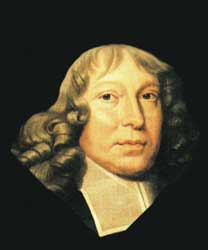 |
The Church of the Covenanters has a precious inheritance. The achievements of the past, the privileges of the present, and the victories of the future - all, all are hers, if she be faithful. The Old Blue Banner leads to the world-wide triumph of the principles it represents. This is no presumption; it is a foregone conclusion, the very language of logic. The certainty is based on God's revealed purpose, and glows in the richest hues of prophecy. Humility forbids boasting; we have not said that the Covenanted Church shall have this honor. But the Banner of the Covenant, by whomsoever borne, will surely be glorified with victory, as Jesus Christ, the great Captain, leads His conquerors to universal conquest." - J.C. McFeeters, Sketches of the Covenanters, p. 411. |
 |
"And it shall come to pass in the last days, that the mountain of the LORD'S house shall be established in the top of the mountains, and shall be exalted above the hills; and all nations shall flow unto it." - Isaiah 2:2 |
 |
The Covenanters were the best theologians in history since the days of the Apostles. They gave us the most famous and most accurate statement of Christian theology and practice, outside of the Bible itself, in the Westminster Standards (the Westminster Confession of Faith, the Westminster Shorter Catechism, the Westminster Larger Catechism, etc.). |
|
|
"All that learning the most profound and extensive, intellect the most acute and searching, and piety the most sincere and earnest, could accomplish, was thus concentrated in the Westminster Assembly's Confession of Faith, which may be safely termed the most perfect statement of Systematic Theology ever framed by the Christian Church." - William Hetherington, The History of the Westminster Assembly of Divines, p. 345, SWRB Reprint. |
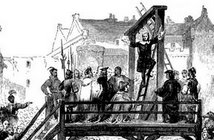 |
The Covenanters also lived what they believed and taught, many showing their great love for the Lord Jesus Christ through tremendous suffering and privation. Many suffered severe persecution, some were tortured and a large number resisted sin unto blood (Hebrews 12:4, Hebrews 11:36-38) - dying as faithful Reformation martyrs, singing the praises of the Lord as they went to their ordained reward of eternal bliss and blessedness in heaven. |
 |
The new SWRB Puritan Hard Drive contains many of the best and rarest Covenanter books. No other collection of digital Covenanter books, MP3s and videos even comes close to the size and extensiveness of the Covenanter collection found on the Puritan Hard Drive - nor has such a comprehensive and easy-to-use digital collection of Covenanter books, MP3s and videos ever existed before. The Puritan Hard Drive contains the cream of the cream of the best of the best concerning Covenanter theology, Covenanter history and Covenanter practice - a covenanted jewel in Christ's crown concerning unwavering and truthful testimony to His everlasting faithfulness to the elect in the covenant of grace. For Christ's crown and covenant no better Covenanter study tool exists than the Puritan Hard Drive! |
More Covenanter Quotes
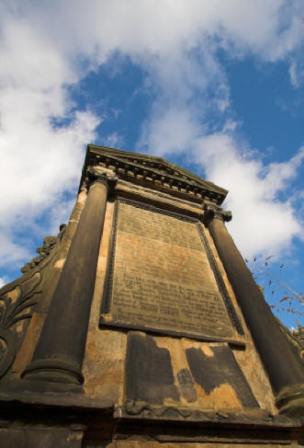 |
The blood of the martyrs imposes obligations upon posterity from generation to generation. The martyrs deeply felt their responsibility for the Church, her purity, her doctrines, discipline, membership; for her loyalty to Christ, her separation from the world, and her administration in the Holy Spirit. Their zeal for the house of God brought them to the front; their passionate love for Jesus Christ placed them on the firing line. There they met every attack made upon Christ and His House; there they stood for the royal rights of Jesus and the honour of His kingdom; there they fell under the murderous fire, giving place to their successors. These soldiers of Jesus knew how to die, but not how to retreat. They did their work well and necessarily left it unfinished. The victory was assured, though not in sight. The death stricken hands reached the bloodstained banner out to another to be carried forward. This war still rages. The supremacy of Jesus Christ is yet disputed; His royal rights are yet usurped by mortals; His Bride the Church, still halts amid many opinions; the ordinances of grace are unblushingly corrupted; the teachings of the Gospel are adroitly doctored. The attacking forces are active, determined, and numerous, as in the days of the martyrs. The tactics differ, but the fight goes on. Heavy, heavy are the moral obligations, that fall to the successors of those who gave their lives for the truth. To recede would be cowardice, desertion from the ranks, perjury within the Covenant, treason against Jesus Christ. Is this too strong? Listen, 'If any man draw back, my soul shall have no pleasure in him.' Surely the times call for Christian Soldiers; yea heroes; possibly, martyrs. Do Covenanters feel their obligation to the Lord? - J. C. McFeeters, Sketches of the Covenanters, 1913, pp. 402-403, as cited in Greg Barrow's book, The Covenanted Reformation Defended. |
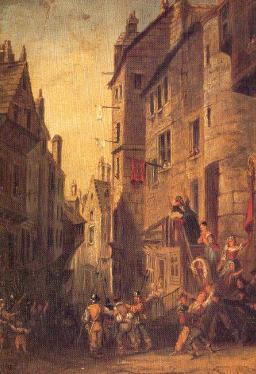 |
"Consider the testimony for which the faithful and honorable martyr James Renwick suffered and died (and note the similarity between his dying testimony and our [RPNA-ed.] terms of communion)... 'Dear Friends, I die a Presbyterian Protestant; I own the Word of God as the rule of faith and manners; I own the Confession of Faith, Larger and Shorter Catechisms, Sum of Saving Knowledge, Directory for Public and Family Worship, Covenants, National and Solemn League, Acts of General Assemblies, and all the faithful contendings that have been for the Covenanted Reformation. I leave my testimony approving the preaching in the field, and defending the same by arms. I adjoin my testimony against Popery, Prelacy, Erastianism, against all profanity, and everything contrary to sound doctrine and the power of godliness; particular against all usurpation and encroachments made upon Christ's right, the Prince of the kings of this earth, who alone must bear the glory of ruling his own kingdom the Church; and in particular against the absolute power affected by his usurper, that belongs to no mortal, but is the incommunicable prerogative of Jehovah, and against his Toleration flowing from his absolute power'" - John Howie, The Scots (Covenanter-ed.) Worthies, 1781, p. 547, as cited in Greg Barrow's "must read" book, The Covenanted Reformation Defended). |
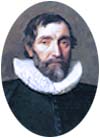 |
"There was one great, and even sublime idea, brought somewhat indefinitely before the Westminster Assembly, which has not yet been realized, the idea of a Protestant union throughout Christendom, not merely for the purpose of counterbalancing Popery, but in order to purify, strengthen, and unite all true Christian churches, so that with combined energy and zeal they might go forth, in glad compliance with the Redeemer's commands, teaching all nations, and preaching the everlasting gospel to every creature under heaven. This truly magnificent, and also truly Christian idea, seems to have originated in the mind of that distinguished man, Alexander Henderson. It was suggested by him to the Scottish commissioners, and by them partially brought before the English Parliament, requesting them to direct the Assembly to write letters to the Protestant Churches in France, Holland, Switzerland, and other Reformed Churches. . . . and along with these letters were sent copies of the Solemn League and Covenant, a document which might itself form the basis of such a Protestant union. The deep thinking divines of the Netherlands apprehended the idea, and in their answer, not only expressed their approbation of the Covenant, but also desired to join in it with the British kingdoms. Nor did they content themselves with the mere expression of approval and willingness to join. A letter was soon afterwards sent to the Assembly from the Hague, written by Duraeus (the celebrated John Dury), offering to come to the Assembly, and containing a copy of a vow which he had prepared and tendered to the distinguished Oxenstiern, chancellor of Sweden, wherein he bound himself 'to prosecute a reconciliation between Protestants in point of religion'. . . . [O]n one occasion Henderson procured a passport to go to Holland, most probably for the purpose of prosecuting this grand idea. But the intrigues of politicians (like the covenant breaker Oliver Cromwell - ed.), the delays caused by the conduct of the Independents, and the narrow-minded Erastianism of the English Parliament, all conspired to prevent the Assembly from entering farther into that truly glorious Christian enterprise. Days of trouble and darkness came; persecution wore out the great men of that remarkable period; pure and vital Christianity was stricken to the earth and trampled under foot. . .' - William Hetherington, History of the Westminster Assembly of Divines, (Edmonton, Alberta: Still Waters Revival Books), pp. 337-339, as cited in The Duty and Perpetual Obligation of Social Covenanting by Greg Price, Samuel Rutherford, George Gillespie, et at. |
 |
"William Hetherington, concerning the Solemn League and Covenant (the epitome of second Reformation attainments), also comments that 'no man who is able to understand its nature, and to feel and appreciate its spirit and its aim, will deny it to be the wisest, the sublimest, and the most sacred document ever framed by uninspired men.'" - The History of the Westminster Assembly of Divines, 1856, SWRB reprint 1993, p. 134), as cited in Dr. Reg Barrow's Saul in the Cave of Adullam (a Debate with Doug Wilson). |
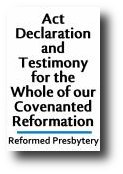 |
"That public, social covenanting is an ordinance of God, obligatory on churches and nations under the New Testament; that the National Covenant and the Solemn League are an exemplification of this divine institution; and that these Deeds are of continued obligation upon the moral person; and in consistency with this, that the Renovation of these Covenants at Auchensaugh, Scotland, 1712 was agreeable to the word of God. - Reformed Presbytery, The Six Points of the "Terms of Ministerial and Christian Communion in the Reformed Presbyterian Church" as listed at the end of The Act, Declaration, and Testimony for the Whole of Our Covenanted Reformation, 1761, 1876. |
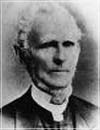 |
"These modern pigmies are too far dwarfed in intellectual stature to measure the altitude, of our glorious Covenanted Reformation - a Reformation which, imbedded in the law and the covenant of God, has already brought civil and ecclesiastical freedom to many millions; and which is doubtless destined to be laid in the foundation of reconstructed society in the millennial period of the world." - The Reformed Presbytery, A Short Vindication of Our Covenanted Reformation, 1879, p. 4. |
 |
Who Are The Posterity Bound By The Solemn League And Covenant? A. We find in the Solemn League and Covenant the following references to 'posterity' which indicates that this National Covenant binds far more than simply the generation that was alive when it was originally sworn: [H]aving before our eyes the glory of God, and the advancement of the kingdom of our Lord and Savior Jesus Christ, the honor and happiness of the King's Majesty and his posterity (Preface); [T]hat we, and our posterity after us, may, as brethren, live in faith and love, and the Lord may delight to dwell in the midst of us (Article 1); [W]e shall each one of us, according to our place and interest, endeavor that they may remain conjoined in a firm peace and union to all posterity (Article 5). B. Note who the 'all posterity' (as mentioned in the Solemn League and Covenant) includes in a letter written by the Westminster Assembly and sent to the General Assembly of the Church of Scotland in 1644: Those Winds which for a while do trouble the Air, do withal purge and refine it: And our trust is that through the most wise Providence and blessing of God, the Truth by our so long continued agitations, will be better cleared among us, and so our service will prove more acceptable to all the Churches of Christ, but more especially to you, while we have an intentive eye to our peculiar Protestation, and to that public Sacred Covenant [i.e. the Solemn League and Covenant- GLP] entered into by both the Kingdoms [Ireland is not formally omitted here, but is omitted only because this English Assembly is addressing the Scottish General Assembly-GLP], for Uniformity IN ALL HIS MAJESTY'S DOMINIONS (The Acts Of The General Assemblies Of The Church Of Scotland: From the Year 1638 to the Year 1649 Inclusive, 4 June 1644, Session 7, 'The Letter from the Synod of Divines in the Kirk of England, to the General Assembly', pp. 231,232. Emphases added). Unless the dominions referred to here are limited by name to specific dominions, the phrase 'in all his Majesty's dominions' must include all dominions that had and should become a part of the British Empire under the rule of the British monarch. Not only did the Westminster Assembly understand the 'all posterity' bound by the Solemn League and Covenant to be 'ALL HIS MAJESTY'S DOMINIONS', but the faithful General Assembly of the Church of Scotland also officially declared the same to be true in their letter to King Charles I (written in 1648): As we do not oppose the restitution of your Majesty to the exercise of your Royal Power; So we must needs desire that that which is GOD'S be given unto Him in the first place, and that Religion may be secured before the settling of any human interest; Being confident that this way is not only most for the Honor of GOD, but also for your Majesty's Honor and Safety. And therefore as it was one of our Desires to the High and Honorable Court of Parliament that they would solicit your Majesty for securing of Religion, and establishing the Solemn League and Covenant IN ALL YOUR DOMINIONS [the Solemn League and Covenant having been sworn and made law by the Parliaments of England and Scotland, it was required that Charles I swear to establish it and to enforce it in all his dominions before he would be allowed to exercise his royal authority-GLP] (The Acts Of The General Assemblies Of The Church Of Scotland: From the Year 1638 to the Year 1649 Inclusive, August 12, 1648, Session 40, 'The Humble Supplication of the General Assembly of the Kirk of Scotland unto the Kings Most Excellent Majesty', p. 439. Emphases added). Furthermore, observe that not only did the Westminster Assembly and the General Assembly of the Church of Scotland interpret the 'all posterity' bound by the Solemn League and Covenant to be those who lived within the bounds of 'all his Majesty's dominions', but it was likewise interpreted to be the case by the Parliament of Scotland (April 29, 1648) in a letter to King Charles I. The legal phrase, 'in all his Majesty's dominions', that is used in this letter cannot be limited to the kingdoms of England, Ireland and Scotland unless those kingdoms were the only ones called 'the dominions of his Majesty' in the legal language of that period (which we will see in a future sermon was far from being the case). [B]efore any agreement or condition be made with his Majesty [King Charles I- GLP] (having found his late concessions and offers concerning religion not satisfactory), that he give assurance by his solemn oath, under his hand and seal, that he shall, for himself and his successors, give his royal assent, and agree to such act or acts of parliament, or bills, as shall be presented to him, by his parliaments of both or either kingdoms respective, for enjoining the league and covenant, and fully establishing presbyterial government, directory of worship, confession of faith, in all his Majesty's dominions; and that his Majesty shall never make any opposition to any of these, nor endeavor any change thereof (John Brown, An Apologetical Relation Of The Particular Sufferings Of Faithful Ministers, p. 196. Emphases added). Moreover, King Charles II swore as the King of Great Britain (June 23, 1650), and bound himself and his successors to the throne to enact the Solemn League and Covenant not only in Scotland, but also 'in the rest of my dominions.' Again since there is no stated limitation as to which dominions are in view, this legal language cannot be limited to two or three dominions, but must include all the rest of his Majesty's dominions throughout the world besides Scotland. I, Charles, King of Great Britain, France [a mere nominal title that carried no legal right-GLP] and Ireland, do assure and declare by my solemn oath, in the presence of the almighty God, the searcher of hearts, my allowance and approbation of the national covenant and of the solemn league and covenant above written; and faithfully oblige myself to prosecute the ends thereof, in my station and calling; and that I, for myself and successors, shall consent and agree to all acts of parliament enjoining the national covenant and solemn league and covenant; and fully establishing presbyterial government, the directory of worship, confession of faith, and catechisms in the kingdom of Scotland, as they are approven by the General Assembly of this kirk and parliament of this kingdom; and that I shall give my royal assent to the acts of parliament enjoining the same in the rest of my dominions; and that I shall observe these in my own practice and family, and shall never make opposition to any of these, or endeavor any change thereof (John Brown, An Apologetical Relation Of The Particular Sufferings Of Faithful Ministers, p. 45. Emphases added). Let us now compare the language (especially that which addresses 'all his Majesty's dominions') that is found in another legal document that is completely unrelated to the Solemn League and Covenant, namely, the Oath of Allegiance to King James I. If the language of this oath includes all dominions of the King outside of England (which I can hardly doubt that any would deny), then likewise the same legal language of 'all his Majesty's dominions' in reference to the Solemn League and Covenant must likewise refer to 'all' dominions without exception and not mere selective ones. I, A.B., do truly and sincerely acknowledge, profess, testify and declare in my conscience, before God and the world, that our sovereign lord, King James, is lawful and rightful king of this realm [England-GLP], and of all other his Majesty's dominions, and countries.... (John Brown, An Apologetical Relation Of The Particular Sufferings Of Faithful Ministers, p. 68. Emphases added). Thus, I conclude from this brief survey that the intended posterity that are bound by the Solemn League and Covenant include those within 'all his Majesty's dominions.' We will in the next sermon clearly demonstrate that the colonies in America and Canada were certainly called in various legal documents 'his Majesty's dominions', thus bringing not only the kingdoms of England, Ireland and Scotland into covenant with the Lord, but also bringing the 'dominions' and colonies of North America (and elsewhere) into covenant with God by way of the Solemn League and Covenant. - Greg Price, A Defense of Covenanting & the Solemn League & Covenant (Part 14) & Who (Including Nations Like The United States and Canada) the SL&C Binds Today. A free MP3 and PDF of this message is at http://www.sermonaudio.com/sermoninfo.asp?SID=1223082221462 - compliments of Still Waters Revival Books (SWRB) |
Dr. Joel R. Beeke Reviews and Recommends
the Puritan Hard Drive

Dr. Joel R. Beeke, Puritan Reformed Theological Seminary
The Puritan Hard Drive is a massive collection of primary Puritan resources, dozens of which are very hard to find anywhere else in the world.
Any lover of Puritan literature, which, more than any other body of literature ever written, powerfully expands our minds, convicts our consciences, allures our hearts, and moves our hands, will find a treasure trove here.
- Dr. Joel R. Beeke, President and Professor of Systematic Theology and Homiletics at Puritan Reformed Theological Seminary https://puritanseminary.org/, Author of many important Reformed books (including the must read, Meet the Puritans: With A Guide to Modern Reprints, https://www.heritagebooks.org/products/Meet-the-Puritans.html), Editorial Director at Reformation Heritage Books, Editor of the Banner of Sovereign Grace Truth magazine and Pastor of Heritage Netherlands Reformed Congregation in Grand Rapids, Michigan, USA.
VIDEO INTRODUCTION TO THE PURITAN HARD DRIVE
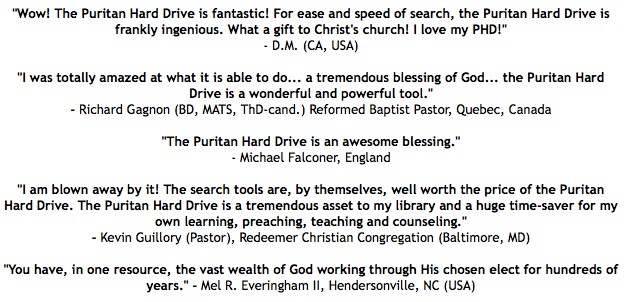

Phone Orders:
(780) 450-3730
To obtain free Reformation books, Puritan MP3s and Calvinistic videos, SWRB discount coupons, etc., add yourself to SWRB's Puritan and Reformed email list by using the form above.
Current Top Sellers
-
1
-
2
All Authors
- Abernethie, Thomas
- Adams, Richard
- Adams, Thomas
- Alexander, Archibald
- Alleine, Joseph
- Ames, William
- Anderson, George
- Anderson, James
- Anderson, John
- Anderson, William
- Annesley, Samuel
- Anonymous
- Apple
- Arrowsmith, John
- Ash, Simeon
- Associate Presbyterian Magazine
- Associate Presbytery of Miami
- Augustine, Aurelius
- Bailllie, Robert
- Baird, Henry
- Balfour, William
- Bannerman, Douglas
- Bannerman, James
- Barker, Matthew
- Barnes, Albert
- Barrow, Reg
- Bates, Stewart
- Bates, William
- Baxter, Richard
- Bayly, Lewis
- Baynes, Paul
- Beaton, Donald
- Begg, James
- Beveridge, James
- Beza, Theodore
- Bining, Hugh
- Binnie, William
- Black, John
- Blaike, Alexander
- Blakeney, Richard P.
- Boettner, Loraine
- Bolton, Samuel
- Bond, John
- Boston, Thomas
- Bowles, Oliver
- Bradford, John
- Brainerd, Thomas
- Breckenridge, Robert J.
- Bredenhof, Wes
- Bridge, William
- Bridges, Charles
- Bridges, Walter
- Bromhall, Andrew
- Brooks, Thomas
- Brown (of Bedford), John
- Brown (of Edinburgh), John
- Brown (of Haddington), John
- Brown (of Wamphray), John
- Brown, C. J.
- Brown, David
- Brown, Henry
- Brown, P. Hume
- Brown, Thomas
- Bruce, Robert
- Buchanan, James
- Bullinger, Henry
- Bunyan, John
- Burgess, Anthony
- Burgess, Cornelius
- Burgon, John W.
- Burns, William C.
- Burroughs, Jeremiah
- Byfield, Richard
- Calamy, Edmund
- Calderwood, David
- Calvin, John
- Cameronian
- Cardell, John
- Carslaw, W. H.
- Carter, Thomas
- Carter, William
- Caryl, Joseph
- Case, Thomas
- Cawdrey, Daniel
- Chalmers, Thomas
- Chambers, Humphrey
- Chaney, James M.
- Charnock, Stephen
- Cheynell, Francis
- Chiniquy, Charles
- Chrystie, James
- Church of Scotland General Assembly
- Clarkson, Andrew
- Clarkson, David
- Close, Albert
- Cokayn, George
- Coleman, Thomas
- Coles, Elisha
- Colquhoun, John
- Commissioners, Scottish
- Conant, John
- Cooper, William
- Corbett, Edward
- Covenanted Ministers of Scotland
- Covenanted Reformed Presbyterian Publishing
- Covenanter Magazine
- Cradock, Walter
- Craighead, Alexander
- Croskery, Thomas
- Crumpler
- Cudworth, Ralph
- Cudworth, William
- Cunningham, John
- Cunningham, William
- Dabney, Robert Lewis
- Dale, James W.
- Darling, James
- Davies, Samuel
- Defoe, Daniel
- Dell, William
- Demaus, Robert
- Dexter, Henry Martin
- Dick, James
- Dick, John
- Dickinson, Jonathan
- Dickson, David
- Doolittle, Thomas
- Douglas, Thomas
- Dunlop, William
- Dunn, Samuel
- Durham, James
- Durye, John
- Edwards, Jonathan
- Edwards, Thomas
- Elgato
- Elliott, E. B.
- Ellis, John
- Enock, Esther
- Erskine, Ebenezer
- Erskine, Ralph
- Evance, Daniel
- Faber, George
- Fairbairn, Patrick
- Fairclough, Richard
- Fairley, John
- Ferguson, James
- Fisher, James
- Flavel, John
- Fleming, David Hay
- Fleming, Robert
- Forrester, Thomas
- Foster, J. M.
- Fowler, Christopher
- Foxcroft, John
- Foxe, John
- Fraser (of Alness), James
- Fulke, William
- Fuller, Andrew
- Fulton, Justin D.
- Gamble, David
- Gauden, John
- Gaussen, L.
- Gavin, Anthony
- George, R. J.
- Gibson, James
- Gibson, Samuel
- Giffin, James
- Gilfillan, James
- Gill, John
- Gillespie, George
- Gilmour, Robert
- Gipps, George
- Girardeau, John
- Glasgow, James
- Goode, William
- Goodwin, Thomas
- Gosson, Stephen
- Gouge, William
- Gower, Stanley
- Graham, John
- Graves, F. P.
- Greene, John
- Greenhill, William
- Guinness, H. Grattan
- Gurnall, William
- Guthrie, James
- Guthrie, William
- Hall, Archibald
- Hall, Henry
- Halliday, Thomas
- Halyburton, Thomas
- Hardwick, Humphrey
- Hardy, Nathaniel
- Harper, James
- Harris, Robert
- Harris, Thomas H.
- Hayward, S.
- Henderson, Alexander
- Henry, Matthew
- Herkless, John
- Herle, Charles
- Hetherington, William
- Hewison, James King
- Heyricke, Richard
- Hicks, Gaspar
- Higher Ground
- Hill, Thomas
- Hislop, Alexander
- Hodge, Charles
- Hodges, Thomas
- Hogg, James
- Hooker, Thomas
- Horton, Thomas
- Houston, Thomas
- Howie, John
- Hughes, George
- Hurst, Henry
- Hurst, John F.
- Hussey, William
- Hutchison, Matthew
- Incase
- Innes, Taylor
- James, John Angell
- Jameson, William
- Jenkyn, William
- Jesuits
- Johnson, Robert
- Johnston, John C.
- Kennedy, John
- Kentish, Richard
- Kerr, James
- Knox, John
- Kurtz, J. H.
- Landis, Robert
- Langley, John
- Lawson, J. R.
- Lee, Samuel
- Leighton, Alexander
- Ley, John
- Lightfoot, John
- Lockyer, Nicholas
- Logitech
- London Ministers
- Lorimer, Peter
- Love, Christopher
- Lusk, Robert
- Luther, Martin
- Lye, Thomas
- M'Crie, Thomas
- M'Donald, John
- M'Leod, Alexander
- M'Master, Gilbert
- M'Millan, John Jr
- M'Neilly, S. R.
- Machen, J. Gresham
- Mackenzie, Robert
- MacLean, William
- Macpherson, Hector
- Magill, George
- Manly, Jr., Basil
- Manton, Thomas
- Marbury, Edward
- Marshall, Stephen
- Martin, Hugh
- Mason, Archibald
- Maynard, John
- McCarty, Burke
- McFeeters, J. C.
- McFetridge, N. S.
- McKnight, W. J.
- McNaugher, John
- McWard, Robert
- Mede, Joseph
- Melville, James
- Mewe, William
- Microsoft
- Miller, Samuel
- Milligan, James
- Milwain, John
- Ministers of the General Synod of Ulster
- Mitchell, Alexander F.
- Morison, William
- Morris, Edward D.
- Murray, Matthew
- Nalton, James
- Nave, Orville J.
- Needler, Benjamin
- Ness, Christopher
- Nevin, Robert
- Newcomen, Matthew
- Newton, Isaac
- Newton, Richard
- Newton, Thomas
- Northern Presbytery Choir
- Oburn, William
- Original Covenanter Magazine
- Owen, John
- Palmer, B. M.
- Palmer, Herbert
- Parliament, English
- Paul, John
- Perne, Andrew
- Perrin, Jean Paul
- Peterkin, Alexander
- Peters, Hugh
- Pierce, James
- Pikering, Benjamin
- Pink, A. W.
- Platt, S. N.
- Pollok, Robert
- Pond, Enoch
- Poole, Matthew
- Powell, Vavsor
- Presbytery, Reformed
- Pressly, John T.
- Price, William
- Proffet, Nicolas
- Provan, Charles
- Puritan Divines
- Reformed Presbytery of Scotland
- Reformers, Various
- Reid, H. M. B.
- Reid, John
- Reyner, William
- Reynoldes, Edward
- Rice, N. L.
- Ridgeley, Thomas
- Roberts, Francis
- Roberts, William L.
- Robinson, Hastings
- Robinson, John
- Rollock, Robert
- Romaine, William
- Rutherford, Samuel
- Ryle, J. C.
- Salwey, Arthur
- Scipione, George C.
- Scot, William
- Scott, David
- Scudder, Henry
- Seaman, Lazarus
- Sedgwick, Obadiah
- Sedgwick, William
- Session Book of the Parish of Penninghame
- Shaw, J. W.
- Shedd, William G. T.
- Shepard, Thomas
- Shields, Alexander
- Sibbes, Richard
- Simpson, Robert
- Simpson, Sidrach
- Smeaton, George
- Smith, B. M.
- Smith, Peter
- Smith, Thomas
- Smith, William
- Speck
- Sproull, Thomas
- Spurgeon, Charles
- Spurstowe, William
- Stacy, James
- Stalker, James
- Staunton, Edmund
- Steele, David
- Steele, Richard
- Sterry, Peter
- Steven, William
- Stewart, Alexander
- Stewart, James
- Strickland, John
- Strong, William
- Sumner, Charles
- Sundry Ministers of London
- Swinnock, George
- Sylvester, Matthew
- Symington, Andrew
- Symington, William
- Synod of Dort
- Synod of the Reformed Presbyterian Church in Scotland
- Taylor, Francis
- Temple, Thomas
- Tesdale, Christopher
- Thompson, David
- Thompson, Elbert N. S.
- Thomson, James Pringle
- Thomson, John
- Thorburn, John
- Thornwell, James Henley
- Thorowgood, Thomas
- Todd, A. B.
- Toplady, Augustus
- Torshel, Samuel
- Traill, Robert
- Trapp, John
- Tuckney, Anthony
- Turretin, Francis
- Tyndale, William
- Valentine, Thomas
- Van De Velde, Abraham
- Various Authors
- Vass, L. C.
- Vernon, S. M.
- Vincent, Thomas
- Vines, Richard
- Vinke, Peter
- W. L. S. G.
- Wagner, Michael
- Walker, George
- Walker, Norman
- Walker, Patrick
- Wallace, James
- Ward, John
- Ward, Nathaniel
- Ward, Samuel
- Warren, John
- Watson, Thomas
- Welch, John
- Westminster Assembly
- Westminster Divines
- Whincop, John
- Whitaker, Jeremiah
- Whitaker, William
- White, John
- White, Thomas
- Wilkinson, Henry
- Williams, Daniel
- Willson, James M.
- Willson, James R.
- Willson, Samuel M.
- Wilson, Thomas
- Winchester, S. G.
- Winslow, Octavius
- Witherow, Thomas
- Witherspoon, John
- Withrow, W. H.
- Witsius, Herman
- Wood, James
- Woodcock, Francis
- Wycliffe, John
- Wylie, James A.
- Wylie, Samuel
- Young, Thomas
- Zanchius, Jerome



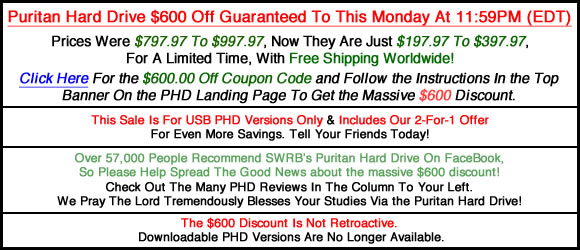
.jpg)






























